-
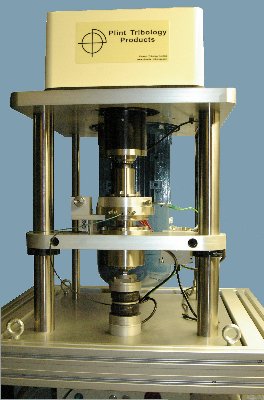
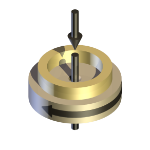
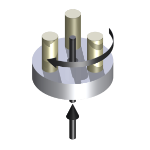
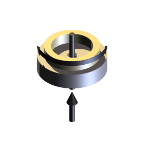
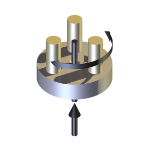
Description
TE 93 Precision Rotary Tribometer provides a lower load range than the standard TE 92 Rotary Tribometer, on which it is based. The incorporation of a linear air bushing in the loading and friction torque assembly allows precise control of the load in the range 1 to 1,000 N and corresponding precision in the measurement of friction torque. Load is applied by means of servo controlled pneumatic bellows with force transducer feedback. The unit is specifically designed to run tests in the thrust washer and three pin on disc test configurations, with on-line measurement of friction, wear displacement (by capacitance probe) and sample temperature.
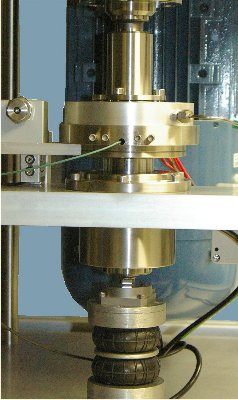
Test may be run in accordance with the guidelines laid out in ASTM G99 Wear Testing with a Pin-on-Disc Apparatus and ASTM D3702 Standard Test Method for Wear Rate of Materials in Self-Lubricated Rubbing Contact Using a Thrust Washer Testing Machine. In addition to continuous rotation, a crank mechanism is included to allow oscillating motion to be generated.
Electro-chemical Cell and Potentiostat Option
The optional electro-chemical test cell allows tests to be run with three rotating ball on disc/pin on disc configurations. It includes a Faraday cage, temperature controlled fluid circulator and precision shaft slip-rings. A silver/Silver Chloride reference electrode and a platinum mesh counter electrode are included.
The potentiostat, which is triggered by COMPEND, is a Gamry Instruments Reference 600 Potentiostat/Galvanostat/ZRA and is supplied with licenses for DC105 DC Corrosion, CPT110 Critical Pitting Temperature, EN120 Electrochemical Noise Experiment, EFM140 Electrochemical Frequency Modulation, PHE200 Physical Electrochemistry, PV220 Pulse Voltammetry, EIS300 Electrochemical Impedance,ESA410 Electrochemical Signal Analyzer, VFP600 Virtual Front Panel, PWR800 Electrochemical Energy software.Control and Data Acquisition
Control and data acquisition are implemented via host PC running COMPEND 2020 Windows compatible software, in conjunction with a Phoenix Tribology USB micro-controller interface.
Automatic control is implemented via user programmable test sequences. Manual control is implemented using on screen toggles. Data is stored to hard disc in either .csv or .tsv file formats. -
Technical Specifications
Thrust Washer: According to ASTM D 3702 Pin Track Radius: 10 to 35 mm Pin Size: 8 mm diameter x 15 mm long Disc Diameter: 75 mm maximum Rotational Speed: 30 to 3,000 rpm Oscillating Motion: +/-10 degrees at 25 Hz +/-15 degrees at 20 Hz +/-20 degrees at 18 Hz +/-25 degrees at 15 Hz +/-35 degrees at 10 Hz +/-45 degrees at 8 Hz Load Range: 1 to 1,000 N Maximum Temperature: 200°C Wear Resolution: 0.2 microns Motor: 2.2 kW a.c. vector motor Interface: Phoenix Tribology USB micro-controller interface Software: COMPEND 2020 Controlled Parameters Rotational Speed Load Temperature Test Duration Measured Parameters Rotational Speed Wear Friction Force Temperature Number of Revolutions Test Duration Sliding Speed Friction Coefficient Sliding Distance Services Electricity: 220/240V, single phase, 50 Hz, 7.5 kW 110/120 V, single phase, 60 Hz, 7.5 kW Clean, dry air: 4 cfm at 8 bar (120 psi) -
Applications
corrosion and wear electro-chemical cell friction materials oscillating contact pin on disc plastics polymers potentiostat PV diagrams self-lubricating materials thrust washer tribo-corrosion -
Publications
Paper # 1157 Development of Ring on Disc tests for elastomeric sealing materials A Hausberger, I Godor, F. Grün, G. Pinter, Th. Schwarz International Tribology Conference, TOKYO 2015 Paper # 1228 The Potential of Tribological Application of DLC/MoS2 Coated Sealing Materials C Wang, A Hausberger, P Nothdurft, J Lackner Coatings 2018, 8(8), 267 Paper # 1232 Tribological Behavior of HNBR in Oil and Gas Field Applications W Balasooriya, B Schrittesser, C Wang, A Hausberger Lubricants 2018, 6(1), 20 Paper # 1341 Fretting Behavior of Thermoplastic Polyurethanes C Wang, A Hausberger, M Berer, G Pinter, F Grün Lubricants, 2019 – mdpi.com -
User List
Launched 2008
University of Leoben Austria Evonik Industries, Degusa Germany Stuttgart University Germany -
Download the Machine Leaflet

